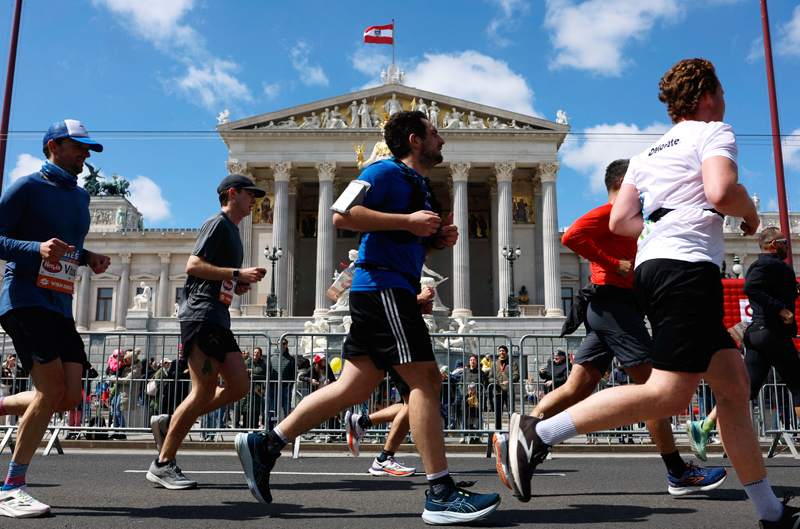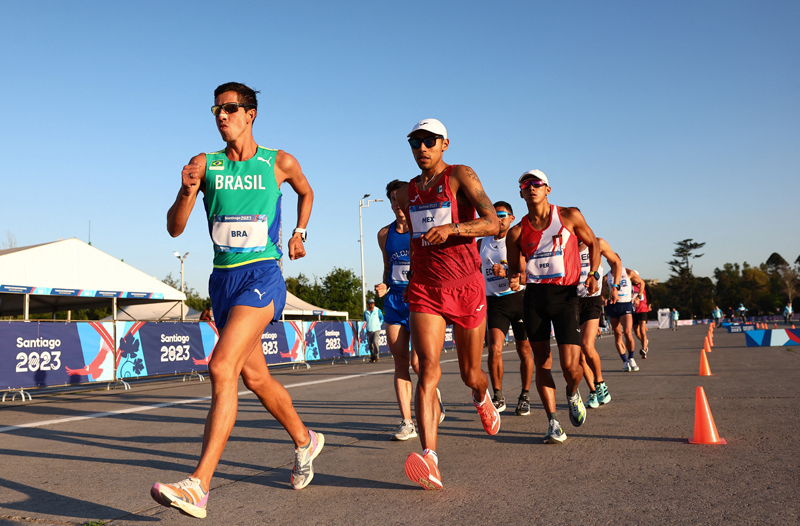Athletes: Yes or no to keto?
In recent years, keto diets have been increasingly promoted to boost endurance performance. But do they really work and if so, how should athletes use them? Andrew Hamilton looks at the scientific evidence...

In recent years, keto diets have been increasingly promoted to boost endurance performance. But do they really work and if so, how should athletes use them? Andrew Hamilton looks at the scientific evidence...
Humans have always been searching for a ‘magic nutrition bullet’ – something simple that gives increased vitality, health and longevity. The ancient Mayan civilisation revered the cocoa bean, while in ancient Greece, athletes consumed garlic for strength before engaging in battle or competing in the earliest Olympics. Fast forwards a few thousand years and human nature hasn’t changed very much. Every week it seems, various performance and health claims are being made for all sorts of individual foods, diets and different eating philosophies – for example, so-called clean eating.
One diet that is becoming increasingly popular is the ‘ketogenic (often termed keto) diet’, which is designed to radically alter energy metabolism in the body. But while there’s good evidence that a keto diet can provide health benefits for those suffering from certain medical conditions, there’s a good deal of controversy about its role in relation to athletic performance.
What is a ‘keto’ diet?
The ketogenic diet is an almost zerocarbohydrate, high-fat diet. It involves drastically reducing carbohydrate intake, and replacing it with fat. The near elimination of carbohydrate puts your body into a metabolic state called ketosis. The rationale is that this forces the body to become very efficient at burning fat for energy. The high percentage of fat intake and low carbohydrate also promotes the formation of natural substances called ketones in the liver, which lowers blood sugar levels, in turn placing less stress on the insulin system. This can lead to health benefits in some individuals with certain medical conditions (see later).
The standard ketogenic diet is a very low-carbohydrate, moderate-protein and high-fat diet. It typically contains around 75% fat, 20% protein and only 5% carbohydrate. This is in stark contrast to a normal ‘ample-carbohydrate, lowish fat diet’ (the type traditionally recommended for endurance athletes), which may typically comprise of 25% fat, 55% carbohydrate and 20% protein (see figure 1).
There are also other modified variants of the keto diet, which are perhaps easier and more practical to live with. These include the ‘cyclical ketogenic diet’, which involves periods of higher-carbohydrate feeding (for example five days consuming a keto diet followed by two days of higher carbohydrate intake). There’s also the ‘targeted ketogenic diet’, which allows you to consume higher intakes of carbohydrate before or after specific training session. However, there’s very little research on these variants so we won’t discuss these further.
Figure 1: Traditionally recommended diet for athletes

Much of the current research into keto diets has been carried out in the context of medical research. However, very-low carbohydrate diets (ie keto diets) have actually been employed since the 1920s as a therapy for epilepsy. More recent research suggests that in some cases, they can completely remove the need for medicationEpilepsy Curr. 2011;11:88–89.
For the past 55 years, keto diets have also been explored as a method of treating obesity, particularly since the 1990s, when the combined condition of type II diabetes and obesity (so-called ‘diabesity’) started to become a real health concern in Western societies. More recent evidence suggests that a keto diet can be a powerful weightloss treatment tool for individuals in this category, with significant knock-on benefits for heart health tooAm J Clin Nutr. 1996;63:110–115 Ann Intern Med. 2005;142:403–411 Mol Cell Biochem. 2006;286:1–9 PLoS One. 2013;8:e57873.
Figure 2 shows four key areas of health where research has provided very strong evidence supporting the use of keto diets. However, other recent research over the last decade or so has also provided some evidence of the therapeutic potential of ketogenic diets in other pathological conditions, such as polycystic ovary syndrome, acne, neurological diseases, and possibly cancerEur J Clin Nutr. 2013 Aug; 67(8): 789–796. As ever though, more research will be needed before we can be confident of these benefits.
Figure 2: Health conditions (and mechanisms) where keto diets provide benefits

How do keto diets work?
Switching to a keto diet profound affects the balance of energy provision in the body. Instead of the bulk of energy being derived from glucose oxidation (from ingested carbohydrate), the lack of dietary carbohydrate effectively forces the body to break down stored fat molecules into short fragments called ketones (hence ‘keto’), which can then be oxidised for energy (see figure 3 below). Both of these energy pathways normally work in tandem but during a keto diet, the balance is drastically shifted away from glucose metabolism towards the breakdown of fats and the production of ketones.
It’s this shift in metabolism that is thought to produce the health benefits discussed. With carbohydrate foods virtually eliminated from the diet, blood glucose levels aren’t subject to the peaks and troughs that can easily occur – especially when refined or sugary carbohydrates are consumed. This in turn reduces the demand for the hormone insulin, which instructs cells to absorb any excess glucose and either store it as muscle glycogen, or (as is most likely the case in those who are sedentary) convert the excess glucose to fat. These repeated cycles of blood sugar disturbance (steep blood glucose rise, insulin secretion and fat deposition) are believed to result in fundamental metabolic disturbances that lead to health problems; a keto diet effectively eliminates these disturbances at a stroke.
Keto diets and athletic performance
There’s no denying the potential benefits of keto diets for certain medical circumstances – for example weight loss in diabetes and obesity. But are there any performance benefits for endurance athletes? This is a subject that has become very topical of late. You only need to do a quick search online to see that there are dozens of website making great claims for keto diets and athletic performance. However, much of the information on this topic is at best confused, and at worst, deliberately misleading (see panel 1). Moreover, many keto-diet advocates fail to point out the potential drawbacks of a keto diet (panel 2).
1: Keto diets: internet facts or fiction?
A quick search on Google reveals lots of websites promoting keto diets for athletic performance. Some of the better ones provide study references purporting to support the notion that keto diets can boost performance (or at least won’t harm it). However, dig a little deeper and all is not what it seems. On one site for example, the claim is made that it just isn’t true that endurance performance is decreased on a keto diet.
The site’s authors cite a study on well-trained cyclists who followed a keto diet for four weeks and claim that the results showed that aerobic endurance was not compromised at allMetabolism. 1983 Aug;32(8):769-76. In their words: “The cyclists’ bodies adapted through ketosis, limiting both glucose and glycogen stores, and using fats as the predominant energy source. Even if you are doing very long cardio training, marathons and biking included, a ketogenic diet has been proven time and time again.”
What they fail to mention however is that this 1983 study looked at submaximal cycling ability – at just 62%-64% of maximum aerobic power (ie a very easy intensity) – not the kind of hard intensities you would experience when racing or performing high-quality training session such as intervals. Indeed, the study authors concluded that their results suggested that the cyclist performances at higher intensities were compromised.
To further support their claims of the suitability of keto diets for elite endurance athletes, they cite another study, showing that a keto diet didn’t harm explosive strengthJ Int Soc Sports Nutr. 2012 Jul 26;9(1):34. However, this study was conducted on artistic gymnasts – hardly representative of runners, cyclists, triathletes, rowers etc! While it’s true that in this study, the gymnasts lost body fat while retaining strength, and the cyclists were able to gain a larger proportion of their energy during submaximal exercise from fat, it’s extremely important to understand that many of these websites may only provide part of the picture.
2: Potential drawbacks of keto diets
- Switching to a keto diet, usually leads to a period of side effects such as poor energy and mental function, sleep issues, nausea, digestive discomfort.
- A keto diet maybe difficult to sustain over long periods. Not only can it become boring, it can make social eating with family or friends quite challenging.
- Food choices are much less limited, which can increase the risk of certain micronutrient deficiencies.
- Eliminating whole carbohydrate reduces dietary fibre intake, which can increase the risk of constipation.
- A keto diet may be unsuitable or even dangerous for those with certain medical conditions such as pancreatic insufficiency, kidney problems or gallbladder disease. It may also be risky for those taking certain types of medication.
Figure 3: Energy provision from normal (high carbohydrate) and keto (higher fat) diets

Fat burning and weight loss
In theory, if keto diets can force the body to become extremely efficient at burning fat, there are two potential benefits for endurance athletes:
- Improved body composition – with fat burning enhanced, it should be easier for athletes to burn more fat during training (and at other times), which could mean lower levels of body fat and a better power-to-weight ratio.
- Improved performance over longer distances – a greater proportion of energy derived from fat should mean a reduced reliance on stored muscle glycogen. Given these glycogen stores are limited in capacity, this should in theory allow athletes to train and race for longer with ‘hitting the wall’ or ‘bonking’, thus improving performance of very long distances.
There’s no doubt that switching to a keto diet does increase fat burning during submaximal exercise. In the stud on cyclists (box 1 above), the researchers saw a large increase, which compensated for the very greatly reduced energy supplied by carbohydrate Metabolism. 1983 Aug;32(8):769-76.. However, when you look at this study in greater depth, performance was not enhanced. As the researchers themselves explained: “The price paid for the conservation of carbohydrate during exercise appears to be a limitation of the intensity of exercise that can be performed. Our ketogenic diet did not (as is popularly believed) enhance exercise capacity or performance. At best, the cyclists’ endurance at submaximal intensities was preserved only at the expense of ability to undertake high-intensity exercise.”
In a 2015, Professor Louise Burke, one of the world’s leading experts on nutrition for endurance, published a review study looking at the benefits (or otherwise) of keto and other high fat diets for endurance athletesSports Med (2015) 45 (Suppl 1):S33–S49. The results are summarised in table 1.
Prior to 2015, there’s little data (just three studies - see table 1) to go on in terms of properly controlled scientific trials (as opposed to anecdotal reports). But what we can say is that 1) Yes, a keto diet could lead to body-composition benefits for athletes, and 2) No, it doesn’t seem to produce any performance gains – in fact, high-intensity performance may even be harmed.
In an effort to spread the net a bit wider, Professor Burke then expanded her review parameters to include a wider range of low-carbohydrate, high-fat diet studies – ie not just strict keto diets but other diets that were a little more flexible. For example, in these studies, the protocol was relaxed and carbohydrate ingestion was allowed either during or for a period before exercise. By including more studies on low-carbohydrate, high-fat eating regimes, the hope was that it might be possible to more accurately determine whether there could be clear benefits of a keto-type diet for endurance athletes. The summary of these additional studies is shown in table 2.
Table 1: Early studies on keto diets and performance

What can we definitely conclude about the performance benefits of keto and high-fat, low carbohydrate diets from these combined results? Professor Burke summed it up thus:
- As little as 5 days of training on a high-fat, low-carbohydrate diet can ‘retool’ the muscles to enhance fat-burning capacity. This enhanced fat burning ability persists for a while, even when higher carbohydrate intakes are resumed – pre-event carbohydrate loading and consuming carbohydrate intake during exercise.
- Despite the above, there is a failure to detect clear performance benefits during endurance/ultra-endurance exercise.
- There’s evidence that these diets impair high-intensity exercise performance - probably via a down-regulation of carbohydrate metabolism.
Bang up to date
Prior to 2015, studies on keto diets and athletic performance have been pretty sparse. However, in the last couple of years, a few more studies have been published. One study published just a few months ago looked at the exercise performance effects of a 6-week keto diet in healthy adultsNutr Metab (Lond). 2017 Feb 20;14:17. It found that while fat losses occurred, maximum oxygen uptake and peak power during exercise testing decreased. The researchers concluded that: “While a keto diet does not impact physical fitness in a manner that would impair activities of aerobic training, the drop in maximum performance potential may be a matter of concern in competitive athletes.”
A 2016 study meanwhile investigated the effects of a ketogenic low-carbohydrate, high-fat diet during three weeks of intensified training on metabolism and performance of world-class endurance athletes (race walkers)J Physiol. 2016 Dec 23. doi: 10.1113/JP273230. [Epub ahead of print]. The positive news was that the keto diet markedly increased rates of fat oxidation during exercise over a range of exercise intensities. The downside was that at race pace, the increased rates of fat oxidation resulted in reduced economy (increased oxygen demand for a given speed) Overall, the researchers concluded that: “Compared to training with diets providing high carbohydrate availability, keto diets could harm race performance in elite endurance athletes.”
Once again, the same theme emerges; at lower intensities, a keto diet could be equally suitable for exercise as a traditional high-carbohydrate diet – and with the added benefit of greater fat burning and the potential for favourable changes in body composition (body fat reduction). At higher intensities or in a race situation however, this uprated fat burning counts for nothing; indeed, the reliance on fat burning may down-regulate carbohydrate burning, resulted in reduced performance.
But before we write off keto diets completely for race situations, it’s worth considering the results of a study on elite ultra-marathoners and ironman-distance triathletes who had been following a keto diet for between 9 and 30 monthsMetabolism. 2016 Mar;65(3):100-10. When measured during a 3-hour submaximal treadmill run, the athletes’ average fat oxidation was 59% higher and peak fat oxidation 230% (yes, 230%!) higher than matched ultra-athletes who routinely consumed a normal carbohydrate-rich diet. Importantly, peak fat oxidation in the keto athletes occurred at a much high intensity level that is normally observed in endurance athletes.
This study also found that these ‘keto’ ultra-athletes could maintain normal levels of muscle glycogen and glycogen use during exercise. The researchers therefore suggested that a very long-term keto diet could possibly enhance performance in ultra-endurance events such as the ultramarathon and ironman triathlon, where the distances are much greater and the average race intensity is lower than in sub 3-hour events. In other words, maybe we shouldn’t dismiss the possibility that in some athletes in some circumstances (most likely ultra-endurance events), keto diets could yet be shown to produce benefits. As Professor Burke has writtenSports Med (2015) 45 (Suppl 1):S33–S49: “The recent re-emergence of interest in high-fat, lowcarbohydrate diets, coupled with anecdotes of improved performance by sportspeople who follow them, has created a need to re-examine the potential benefits of this eating style.”
Table 2: More recent studies into keto diets and performance

Practical recommendations
How do these findings translate into practical advice for runners, swimmers, cyclists, triathletes, rowers etc who are willing to consider dietary manipulation to enhance performance? Here are some recommendations:
- The main benefit of a keto diet seems to be uprated fat burning and enhanced weight loss. A keto diet can could therefore be an option during periods of low-intensity, base training – for example during the build-up phase early in the season.
- Expect to feel a greater perception of effort and more fatigue during exercise when switiching to a keto diet – even if your training intensity is low. Over time, this should ease somewhat.
- If you are thinking of trying a keto diet, allow at least five days before expecting to benefit from enhanced fat burning.
- It is not recommended experiment with a keto diet during periods of higher-intensity training, which relies heavily on adequate muscle carbohydrate (glycogen).
- For race events of less than three hours’ duration, continuing a keto diet is NOT recommended as most evidence suggests it will harm maximal performance.
- If you are following a keto diet and a race is looming, it is recommended to switch to a high-carbohydrate diet 24-36 hours beforehand and consume carbohydrate during the race. The enhanced fat burning produced by a keto diet lasts for 36 hours after normal carbohydrate is resumed. The introduction of carbohydrate meanwhile helps ensure high-intensity performance isn’t compromised.
- Be aware that different individuals can have a very different responses to a keto diet; for some, the side effects such as poor energy and mental function, sleep issues and nausea may be severe enough to make it untenable, while others may adapt with relative ease.
- When switching to a keto diet, ensure you stay well hydrated.
- If the benefits of enhanced fat burning and reduced body fat appeal, but you’ve experimented and found a keto diet just too difficult to stick to, consider other options. These include, ‘sleep low’ ( see issue 364 ) and ‘time-restricted feeding’ ( see issue 362 ), which have been scientifically proven to provide benefitsMed Sci Sports Exerc. 2016 Apr;48(4):663-72 J Transl Med. 2016 Oct 13;14(1):290. See below for descriptions.
Sleep low: A carbohydrate-fuelled high-intensity training session is performed in the evening, followed by a low-carbohydrate recovery period and overnight fast, which effectively depletes muscle glycogen for the night. The following morning, after a light, low-carbohydrate breakfast then a prolonged, moderate intensity training session is performed, encouraging glycogen-depleted muscles to adapt to burning fat. Carbohydrate intake is not limited but instead restricted at certain times.
Train low, race high: Periodic training sessions take place in conjunction with a low-carbohydrate diet to enhance fat burning. Before racing, athletes ensure a high-carbohydrate diet and full muscle glycogen repletion.
Time-restricted feeding: There’s no restriction on carbohydrate or a calorie restriction but all meals must be consumed within a 6-hour window each day (see figure 4). Early studies show that the periodic use of this approach produces fat loss and performance gains in athletes.
Figure 4: Time-restricted feeding

CASE STUDY: Ben Greenfield
Ben Greenfield has competed as one of the top ranked amateur triathletes in the world, completing over 120 races and 12 Ironman triathlons. He has also won a gold medal for the USA in the long-course triathlon. Ben is also a keen advocate of the keto diet and in 2015, Ben took part in the ‘Faster’ study, to see how his triathlon training would stand up to a keto dietMetabolism. 2016 Mar;65(3):100-10. In preparation for his experiment, Ben followed a diet of 80 to 90% fat and 5 to 10% carbohydrates for 12 months. His protein intake would vary depending on the day’s activities. For example, protein intake would be approximately 20% on days he ran or did weight training. On average, the majority of his diet was fat based.
Ben did two ironman triathlons that year (Ironman Canada and Ironman Hawaii.) He stresses however that his low-carbohydrate diet did not mean a zero carbohydrate diet. Using Ironman triathlon as an example, participants may be out competing for ten or more hours. When passing someone the on the bike, a person may go from their normal race pace of 250 watts up to 400 watts for a few moments. This surge of energy will require the body to burn through at least some carbohydrate. Overall, Ben took in about a quarter of the amount of carbohydrates that he’d normally consume during the actual event, along with ample amounts of easy to digest proteins, amino acids, easy to digest fats, and medium chain triglycerides.
During that triathlon season, Ben underwent extensive testing to see if there was any difference in the ability of his muscles to store carbohydrate and how quickly the muscle would burn through carbohydrates. Measurements were also taken to determine how much carbohydrates, fats, and calories he burned during exercise. Most physiology textbooks claim that the average person will burn a maximum of around 1 gram of fat per minute during exercise. However, in Ben’s case (and the athletes who had also followed a keto or low-carbohydrate diet for 12 months), fat oxidation values were closer to 1.5 to 1.8 grams of fat per minute. This is significantly higher than the experts expected.
Some critics commented that Ben wasn’t going any faster on the high fat/low-carb diet than those on the high-carb diet. However, as Ben points out, the purpose of the study wasn’t to go faster than those on high-carb diets. Instead, the goal was to maintain similar speeds while increasing fat burning and reducing fluctuations in blood sugar, which he achieved comfortably.
Newsletter Sign Up
Testimonials
Dr. Alexandra Fandetti-Robin, Back & Body Chiropractic
Elspeth Cowell MSCh DpodM SRCh HCPC reg
William Hunter, Nuffield Health
Newsletter Sign Up
Coaches Testimonials
Dr. Alexandra Fandetti-Robin, Back & Body Chiropractic
Elspeth Cowell MSCh DpodM SRCh HCPC reg
William Hunter, Nuffield Health
Keep up with latest sports science research and apply it to maximize performance
Today you have the chance to join a group of athletes, and sports coaches/trainers who all have something special in common...
They use the latest research to improve performance for themselves and their clients - both athletes and sports teams - with help from global specialists in the fields of sports science, sports medicine and sports psychology.
They do this by reading Sports Performance Bulletin, an easy-to-digest but serious-minded journal dedicated to high performance sports. SPB offers a wealth of information and insight into the latest research, in an easily-accessible and understood format, along with a wealth of practical recommendations.
*includes 3 coaching manuals
Get Inspired
All the latest techniques and approaches
Sports Performance Bulletin helps dedicated endurance athletes improve their performance. Sense-checking the latest sports science research, and sourcing evidence and case studies to support findings, Sports Performance Bulletin turns proven insights into easily digestible practical advice. Supporting athletes, coaches and professionals who wish to ensure their guidance and programmes are kept right up to date and based on credible science.









